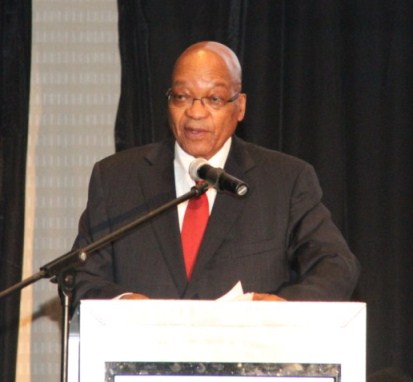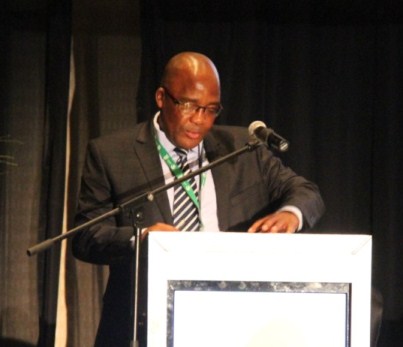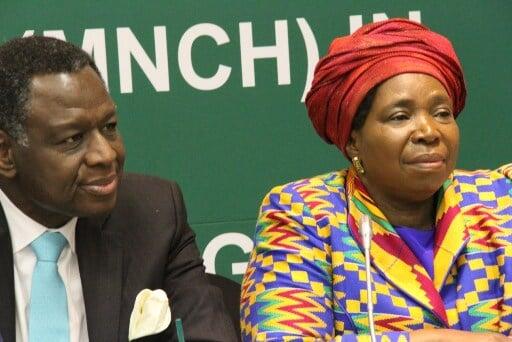JOHANNESBURG, South Africa – It’s time to move the issue of maternal, neonatal and child health forward from policy to action. This was the resounding message delivered on day one of the International Conference on Maternal, Neonatal and Child Health (IMNCH) in Africa, in Johannesburg, South Africa.
Representing the UN, UNFPA Executive Director Dr. Babatunde Osotimehin advised African Union Commission (AUC) Chairperson Dr. Nkosazana Dlamini-Zuma, South African President Jacob Zuma, 27 health ministers and hundreds of government, UN and NGO representatives that the most important message for delegates to take home was that “each of us can make a difference in our respective places. Make sure you can reach women, provide family planning, and ensure a pregnant woman can safely deliver her child.”
He reassured the 27 African health ministers present, plus their deputies and hundreds of other government representatives and development partners participating that the UN remains committed to supporting them. It was due to the commitment and support of the African Union that fewer women were dying in childbirth in Africa and more children were surviving into adulthood than 20 years – or even 10 years – ago, he said.

“This conference represents a major step in the roll out of CARMMA and is the result of the commitment of Dr. Nkosazana Dlamini-Zuma,” he said. When he met the Chairperson of the African Union Commission (AUC) recently, she said to him, “We’ve talked for too long. We want action to save lives.”
Dr. Osotimehin, turning to her during his address, said “Madam, we are here to save lives.” It was now up to the Member States to move from policy to action, he stressed. “We have the knowledge to reduce maternal and child mortality, we have the commitment – let’s hold ourselves accountable. It is the right thing to do,” he said.
The high-level event was co-hosted by the African Union Commission and the Government of South Africa, with the support of the United Nations Population Fund, UNFPA, other UN agencies and the United Kingdom’s Department for International Development (DfID).
The welcoming address by South African Minister of Health Dr. Aaron Motsoaledi was followed by a short video produced by UNFPA on the status of maternal, neonatal and child health. Speeches were presented by Dr. Osotimehin, African Union Commission Chairperson Dr. Nkosazana Dlamini-Zuma, South African President Jacob Zuma, South African Minister of Health Dr. Aaron Motsoaledi, Representative of Civil Society Organizations Dr. Jotham Musinguzi (Africa Regional Director of Partners in Population and Development) and UNAIDS Executive Director Michel Sidibe.

Dr. Dlamini-Zuma said the conference wasn’t expected to make any new findings, but to share evidence and best practices, and to work on action. “When we choose to act together, we act resolutely and undeterred by resource constraints. If we make maternal mortality priority, and we have the political will, we can find the necessary resources to eradicate maternal and neonatal mortality. To spend resources to save lives is not an expense but an investment in our common humanity.”
What is needed is a common action plan, and then to all work towards that action plan, she said.
South African President Jacob Zuma said Africa had achieved much in 50 years of independence from colonialism, and it was crucial that the improvement of women and children’s health was added to this.
“As leaders, it is within our power to do everything to ensure no women dies while giving life,” he said.
HIV & AIDS had completely altered the picture of maternal and child mortality in Africa. In fact, it had “altered the course of history in Africa. We cannot ignore the impact, especially on the health of women and children.” He urged the delegates to “continue to make Africa a better place for all our peoples.”
UNAIDS Executive Director Michel Sidibe said it was important to reflect on how to shift the paradigm from focusing on diseases to a holistic approach to women’s and children’s health. “We should not wait for women to be pregnant or to become infected with HIV before working to save lives,” he said. “It needs to be a lifelong process, a life-cycle approach.”
Dr Jotham Musinguzi, speaking on behalf of civil society organizations, noted the concern of African health ministers regarding the status of women’s and children’s health. “We are here to deliver on two messages. The first is to prioritize increased investment in women’s and children’s health in Africa. The second is, as countries, and as governments, we have all signed the various agreements, including CARMMA, and we need to keep our promises for women and children – also because it is the right thing to do. We, from civil society organizations, stand ready to work with you to do whatever it takes to deliver for women and children on the continent.”

In closing, South African songstress and UNICEF Goodwill Ambassador Yvonne Chaka Chaka said: “Today, millions of African women and children are dying in what should be a joyous moment. Your success will be measured by how these deliberations are translated into lives saved. This is a war we must win.” She wished the delegates well in their deliberations, before giving a rousing rendition of the song, ‘Let the Children Live’.
The afternoon plenary session focused on achievements, lessons learned and good practices in maternal and neonatal and child health (MNCH). The health ministers of Eritrea, Malawi and South Africa described good practices in their respective countries in reducing maternal and child mortality.
Dr. Osotimehin spoke on the need to mobilize leadership on this issue in Africa, down to the community level. “Making them take responsibility for the care of their communities will provide stability in the long term.” He also talked of the need for public-private partnerships and said that UNFPA, through the AU, would continue to work with Member States to ensure the reduction of maternal mortality.
Afterwards, the delegates broke into parallel sessions on service delivery, child health, gender issues influencing MNCH, and a multi-sectorial ministerial workshop. The conference ends on Saturday.
~ Lindsay Barnes





